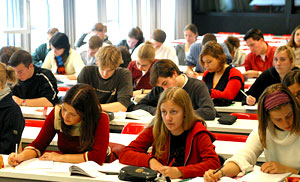Are investments in smaller classes worthwhile?

Class size is hotly debated and on top of the educational agenda in many countries. In general, smaller classes are preferred by both teachers and parents. Since Ministers of Education can spend their money only once, what is the best way to spend a country’s educational budget?
What should be prioritized to increase the quality of education with a restricted budget: better teacher salaries, more educational time, better opportunities for the professional development of teachers or smaller classes?
Findings from the OECD Program for International Student Assessment (PISA) that investigates secondary education among all OECD countries show that average class size varies from less than 20 students in fo example Denmark and the United Kingdom, to more than 34 students in Korea. The contrast is even more striking in other G20 countries; in China, for example, the number of students per class reaches the 50 students mark.

Korean of Finnish model
Class size, together with students’ instruction time, teachers’ teaching time and teachers’ salaries, is one of the key variables that policy makers use to control spending on education. Between 2000 and 2009, many countries invested to decrease class size, but student performance has improved in only a few of them.
Apart from optimizing public resources, reducing class size to increase student achievement is an approach that has been tried, debated, and analyzed for several decades. Some countries like Finland favor smaller class sizes of less than 20 students and the Fins are among the most successful countries in educational outcomes. However, other countries like Korea have much bigger classes, over 34 students, but also feature at the top of the PISA ranking
The PISA findings suggest that systems prioritizing teacher salaries over smaller classes tend to perform better. Investments in teachers and their professionalism have a strong, longterm impact, these findings indicate. This confirms research showing that raising teacher quality is a more effective measure to improve student outcomes.
Lessons form Turkey
OECD’s Andreas Schleicher analysed this recently at a meeting on ‘Teachers Day’ in Turkey. He stated that the policy-agenda on this issue had to be very sophisticatde to become mos effective. “Obviously it has to do with the material conditions, relative salaries of teachers and so on. But that’s not so bad in a case like Turkey. I think the harder challenge is the work organization of teachers. If you aim for high-level professionals, you need to offer them a work organization with the kind of peer collaboration.”
“A teacher should not be just delivering the curriculum from the Ministry, but actually contributing to the profession. It has a lot to do with professional autonomy within a collaborative culture. Those are very central elements for success. The work organization probably matters at least as much as salary and conditions.”
“One of the things for Turkey for example is when you look at the outcomes from PISA, some schools are doing really well and compete with the best schools in the world and other schools have very low performances. Good education systems really try to attract the most talented teachers into the most challenging classrooms, and to get the best principals for the most difficult schools.”
“You want to have capable school principals who are instructional leaders, who bring the teachers together, who have them work together, collaborate together; who help their teachers develop lesson plans, who help their teachers evaluate lessons.”
Importance of rigourous evaluation
Schleicher took a special look at the development of recruitment and evaluation of teachers. “Turkey has a fair, objective and rigorous evaluation system for teachers. While many other countries struggle with this, Turkey has achieved this already. My concern is more about relevance. You don’t become a good teacher just by reproducing a lot of knowledge.”
“A lot has to do with pedagogical talent and the teacher recruitment process should involve multiple stages. In the beginning an entrance test I think is the right approach to ensure that teaching is a selective profession, but at the very same time you want to evaluate teacher candidates also based on their pedagogical talent on their professional capabilities. You want to give future schools possibly a role in the evaluation and selection process.”
“If you go to Finland, one of the best performing systems in the OECD, you have of course also an academic selection at the beginning, but the toughest part of the teacher selection process is actually in the second year. Teacher-students spend significant shares of their time in the schools to learn and are evaluated by peers and professional colleagues.”
Meest Gelezen
Vrouwen houden universiteit draaiende, maar krijgen daarvoor geen waardering
Hbo-docent wil wel rolmodel zijn, maar niet eigen moreel kompas opdringen
‘Sluijsmans et al. slaan de plank volledig mis’
Wederom intimidatie van journalisten door universiteit, nu in Delft
‘Free riding brengt het hoger onderwijs in de problemen’
